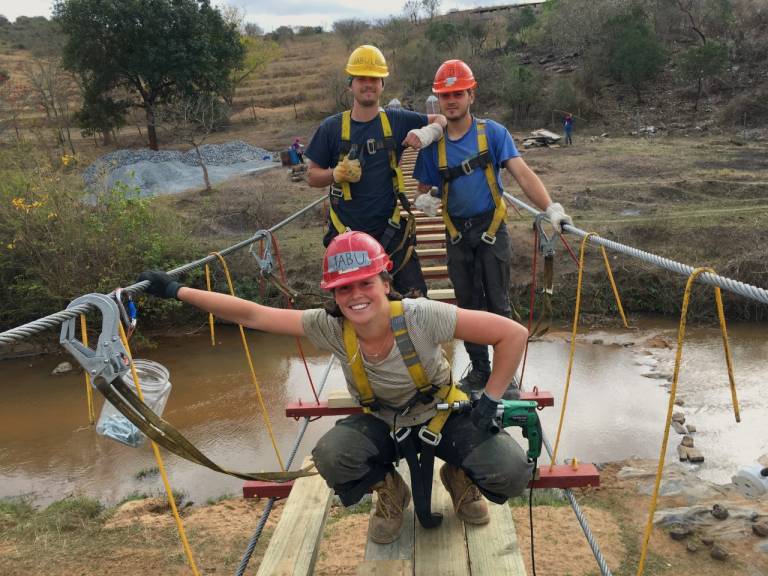Want to help build bridges? The 2019-20 UCL Engineers in Action team need you!
19 November 2019
More members are required for the 19-20 UCL Engineers in Action (EIA) team, who will venture to either Eswatini or Bolivia next summer to build a footbridge, in order to help a community combat rural isolation.

If you are a UCL student looking to put your skills and talents to good use, the Engineers in Action UCL chapter would like to hear from you.
Civil, Environmental and Geomatic Engineering (CEGE) students Sally Warren, Fernando Garrido Carreras, Mungo Cullinan and Leto Patsalidou are part of this year’s EIA team, who plan to travel to either Eswatini or Bolivia in summer 2020 to help build a footbridge that will make a real difference to individuals’ lives.
EIA is a United States non-governmental organisation (NGO) dedicated to empowering underserved communities through the development of sustainable systems and infrastructure. EIA adopt a community-first approach, asking people what their primary needs are, rather than deciding for them. Since 2006, their successful Bridge Program [sic] has seen hundreds of students from 32 universities across the globe design and build 77 footbridges, alongside rural communities, in 11 countries. This has helped connect nearly 150,000 previously isolated people to essential resources.
Summer 2019 saw five CEGE undergraduate civil engineering students, including this year's team co-leads Sally, Fernando and Mungo, accompany peers from Rutgers University in the USA to Bhekinkhosi in Eswatini. Led by then student, now CEGE graduate, Signe Swarttouw (whose blog is linked to below), the 2018-19 team constructed a suspended footbridge over the White Mbuluzi river, working with local masons, community and Bridge Corps members (experienced bridge builders). The whole project took six weeks, and really brought home to the UCL team the active role civil engineering can play in positively developing communities, through both the infrastructure itself and community involvement in the construction process.
As third year Engineering (Civil) MEng student Sally explains: “Every year thousands of people in rural areas worldwide are cut off from basic amenities such as schools, markets and health centres, because of impassable rivers or terrain. Using footbridges as one way to combat this isolation provides a simple, achievable solution, and engaging the local community in the workforce is inspired.”
UCL is home to the only EIA chapter outside North America, with CEGE students taking the lead in projects over the past four years, building bridges in Panama and Rwanda, as well as Bolivia and Eswatini. CEGE itself has also supported the UCL chapter both financially and logistically.
Preparatory work for next summer’s trip will be carried out until the end of second term, with travel scheduled to take place between mid-June and mid-September 2020. The UCL EIA team not only need to plan their project, but also raise substantial funds, to cover the costs of building materials, insurance and travel.
Sally notes how the Bridge Program is “a unique chance to get to know a new country and culture. Being part of the UCL EIA team is an opportunity to potentially get involved at every stage in the bridge building process. From designing the bridge, to digging the foundations and laying the decking, this is the best experience to prepare for the world of civil engineering.
We are looking for applicants to join a team that will travel to either Eswatini or Boliva to build a bridge in summer 2020. A range of roles can be applied for, from managing fundraising, the bridge design, logistics and construction to health and safety, quality and project comms/media.”
Mungo, also a third year Engineering (Civil) MEng student, explains how “getting involved and potentially travelling to build a bridge is a fantastic experience that will allow students to put their knowledge into practice, enhancing the skills learned during their degree programme – whether technical or transferable. You will also gain valuable experience for future careers, particularly engineering and project management careers.”
If you would like to be part of this year’s EIA team, you don’t have to be a civil engineering or even an engineering student. Applications from postgraduate taught and research students, as well as undergraduates, are also encouraged. Not everyone will get the opportunity to travel abroad in 2020, but even those who don’t will still have a vital part to play.
Links
Please note, some links lead to external sites.
- UCL Civil, Environmental and Geomatic Engineering
- Engineers in Action website
- Engineering (Civil) MEng programme page
- Signe’s blog
Image
- Caption: Sally, Mungo and Fernando standing proudly on the footbridge during its construction in Bhekinkhosi, Eswatini, summer 2019.
- Credit: UCL EIA 2019 team.
 Close
Close

